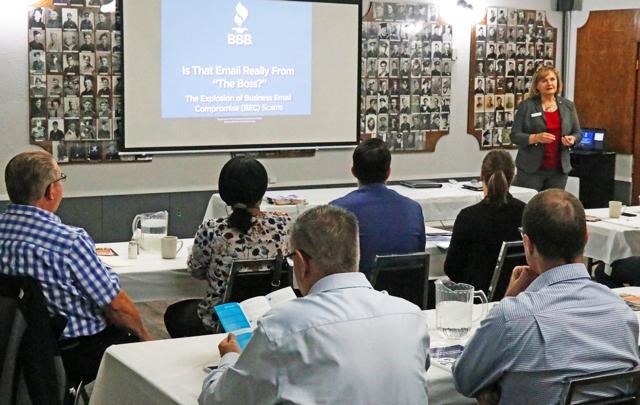Weyburn area business owners and employees were urged to be vigilant about monitoring their emails for possible fraudulent scams, in a presentation by the Better Business Bureau (BBB) hosted by the Weyburn Chamber of Commerce on Wednesday morning.
Karen Smith, CEO of the Saskatchewan Better Business Bureau, made the presentation at a business breakfast held at the Legion Hall, held to mark Small Business Week in Weyburn.
“This topic really hits home,” said Smith, noting that email scams began by targeting individuals, but it is now a major worldwide threat that targets small, medium and large-sized businesses.
“This is about doing things in a secure way,” she said. “You’re not going to be completely foolproof.”
As the BBB office in Regina has about 80 per cent of businesses in the province in their database, they keep track of the top threats С����Ƶ made by fraudsters. The BBB has 113 offices across North America, 10 in Canada, so their database is quite extensive in conjunction with the Canadian Anti-Fraud Centre. They also keep track of scams on their website at , which is continuously updated as new scams appear.
An example of a scam that businesses should watch for are emails from website claiming to offer government grants. The scam comes as they request an upfront fee to have the grant administered, which is never requested for a legitimate government grant.
“Scams are really good at money laundering,” said Smith. “Don’t give out banking information to anyone you don’t know. Verify it by phone, even if it comes from a trusted friend or source.”
Job scams are a problem, as they make job offers with a promise of assistance with immigration to get into Canada.
“The fraudster uses the names of companies that exist, in order to get their contact information, and the applications for the jobs are used to collect personal and financial information,” said Smith.
The Number One business fraud in Canada and the U.S. is the business email compromise fraud, which has cost businesses $3.1 billion since 2016, including $33.6 million in Canada.
According to the Better Business Bureau, only five per cent of fraud victims come forward to report the crime once they are taken in by a scam.
Fraudsters use the full range of communications to commit scams, with 23 per cent using a website; 23 per cent are by phone; 17 per cent are by email; 13 per cent are through social media, with all forms of only delivery accounting for 67 per cent of all reports of fraud.
The means of payment most often used are credit cards, with 38 per cent of scams using this method; bank account debits account for 12 per cent, 11 per cent are by wire transfers, and nine per cent are by gift cards or prepaid cards.
The average loss by wire transfer is around $35,000, and those involving gift cards (such as iTunes cards) see losses of $1,000-2,000.
One statistic that Smith said is misleading is that business email compromise frauds have a success rate of about one in 300 attempts. When a loss occurs, it can be substantial, she noted.
“The trouble is, that one can be very expensive, as the City of Saskatoon found out, with well over $1 million loss. They assumed it was from a legitimate supplier,” said Smith, referring to a major fraud perpetrated on that municipality.
An example is an email fraud where the message purported to be from the company’s CEO, asking employees to buy up a certain amount of gift cards without telling anyone (as it’s supposed to be a surprise gift for an employee).
Smith noted that at one company she was in touch with recently, four employees received the exact same email claiming to be from their CEO. Three of the employees didn’t believe it, but the fourth one thought it was believable and bought the gift cards.
“It was a believable email, as there was no distinction between something that comes from outside or inside the company,” said Smith, adding that the trick is to check the back-end of the address of the email sender to determine if it was from a genuine source or not. Also, the URL will be different from the company’s legitimate URL.
Asked how a scam artist would get the benefit of a gift card, she noted usually the email requesting them will ask the buyer to take a cell phone photo of the back of the card and send it to them, which enables the fraudster to get the value of the card, as it can be used online.
Investigators have noted about 90 per cent of business email compromise frauds come from Nigeria, with the remainder organized out of Eastern Europe or Ghana, and the Nigerian organizations have been sending immigrants around the world where they continue to perpetrate the frauds from their new home bases.
Of the top scams tracked by the BBB, romance scams are No. 1, taking more than $22.5 million from their victims, followed by income tax extortion scams (more than $6 million lost), online purchase scame (more than $3.5 million lost), and employment scams (more than $4.5 million lost).




